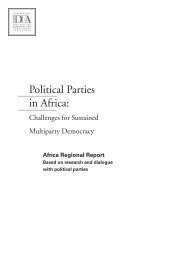Background Document - Danish Institute for Parties and Democracy
Background Document - Danish Institute for Parties and Democracy
Background Document - Danish Institute for Parties and Democracy
You also want an ePaper? Increase the reach of your titles
YUMPU automatically turns print PDFs into web optimized ePapers that Google loves.
INTRODUCTION<br />
The issue is not whether women are able to <strong>and</strong>/or can per<strong>for</strong>m an active role in transitional<br />
politics, because they can <strong>and</strong> are able to contribute at many levels. The issue<br />
is how women’s participation <strong>and</strong> voices can be translated into critical influences <strong>and</strong><br />
decisions in political <strong>and</strong> transition processes <strong>and</strong> why is it that women per<strong>for</strong>m visible<br />
<strong>and</strong> instrumental roles in certain contexts <strong>and</strong> stages of transitions, yet their participation<br />
is not matched with their presence <strong>and</strong> involvement in transitional decision making<br />
processes.<br />
There is global evidence that attest to the existence of various factors that are the<br />
drivers <strong>for</strong> the continued exclusion of women from the critical decisions that shape<br />
the outcomes of political transitions <strong>and</strong> subsequently their participation beyond the<br />
transitional uprisings. Ultimately, the critical area of concern is how to ensure that the<br />
”gains” women make through their involvement <strong>and</strong> partcipation in the dem<strong>and</strong>s <strong>for</strong><br />
political trans<strong>for</strong>mation is institutionalized <strong>and</strong> translates into changes of women’s<br />
status <strong>and</strong> position in society as well as into gender-sensitive changes in political systems<br />
<strong>and</strong> institutions.<br />
This paper highlights that women’s involvement <strong>and</strong> participation in political<br />
transition processes is not a guarantee <strong>for</strong> their inclusion <strong>and</strong> representation in the<br />
critical positions of power <strong>and</strong> decision making at the peak of transitions <strong>and</strong> in the<br />
established nation building institutions.<br />
The paper focuses on some of the prominent factors <strong>and</strong> dominant trends that perpetuate<br />
the marginalisation of women in many parts of the world including countries<br />
in political transitions. Four striking issues or factors across the different regions of the<br />
world, which are intricately connected <strong>and</strong> have significant impact on women in different<br />
countries <strong>and</strong> transitional processes <strong>and</strong> political contexts are presented.<br />
Being cognisant of the fact that there is no “one size fits all” approach as the magnitude<br />
of the issues varies within different country <strong>and</strong> regional contexts, the paper will<br />
also outline possible strategies that can be adapted to support women in transitions<br />
as well as address some of the obstacles encountered by women in these political processes<br />
leading to the <strong>for</strong>mation of democratic governments.<br />
Be<strong>for</strong>e discussing the prominent issues, there is need to underscore the lessons<br />
learnt from the most recent political transitions that occurred in 2011 <strong>and</strong> are still underway<br />
in the Arab Spring. The most recent experiences from the Arab Spring attest to<br />
the deep-seated hurdles that women encounter in order to attain their fair share of participation<br />
<strong>and</strong> representation in positions of power <strong>and</strong> decision making at all levels,<br />
despite women’s contributions.<br />
LESSONS FROM THE ARAB SPRING<br />
In 2011 women in the Arab world demonstrated that women can often play important<br />
roles in revolutionary processes <strong>and</strong> events as women have done be<strong>for</strong>e in Africa, Latin<br />
America <strong>and</strong> Europe. For instance in Egypt <strong>and</strong> Tunisia they participated in the popular<br />
uprisings <strong>for</strong> democracy <strong>and</strong> changes in their societies. As elsewhere in the world,<br />
women in the Arab Spring countries in transition are struggling <strong>for</strong> their fair share of<br />
opportunities to access political power at the onset of transition processes, in view of<br />
the rules of the game that are clearly based on patriarchal values <strong>and</strong> still in flux.<br />
When participating in the revolutions across the transiting countries, women’s dem<strong>and</strong>s<br />
were not only calling <strong>for</strong> the change of the oppressive regimes, but also sought<br />
justice <strong>and</strong> greater empowerment of women in all spheres of life. Many women still<br />
have reason to hope that the “Arab Spring” will bring changes to the Middle East <strong>and</strong><br />
help them realize their dreams <strong>and</strong> secure a better life <strong>for</strong> the next generation of women<br />
through the democratic transitions away from legacies of autocratic rule, social,<br />
economic <strong>and</strong> political marginalisation of women to collaboration between men <strong>and</strong><br />
women, Muslims <strong>and</strong> non-Muslims, government <strong>and</strong> civilians.<br />
WOMEN IN POLITICS DANISH INSTITUTE FOR PARTIES AND DEMOCRACY PAGE 38
















